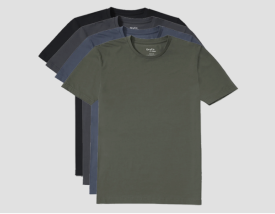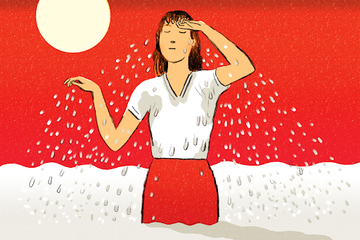Sweating when you feel hot differs from sweating when you’re under pressure. So when you’re pumping iron or trying to beat your fastest run time, the sweat that comes from doing so isn’t the same as when you’re sweating to meet a deadline.
Science has proven that the composition and characteristics of sweat change when you’re stressed out (or conversely, feeling calm). This post will take a look at these differences and what you can do to manage sweat regardless of how you feel emotionally.
Regular Sweat Composition & Characteristics
There’s nothing special or particularly fun about regular sweat. It’s healthy, necessary and common - but that’s about it. Regular sweat comes from the eccrine sweat glands, the ones which cover most of the body. It consists mainly of water, salt and potassium - 99% of it is liquid, and the remaining 1% is salt and proteins.
Here’s a fun fact about regular sweat as well: it’s essentially “time-activated”. Your body produces more of this sweat when the need arises such as when your exercise gets more intense and there’s a greater need to cool off.
This type of sweat is highly efficient. You only produce as much as you need to stay cool, it’s not overly wet and it evaporates over time. Best of all and thanks to its chemical composition, it doesn’t stink.
Stress Sweat Composition & Characteristics
Stress sweat is a different beast altogether. It’s far more interesting than regular sweat but it’s certainly not pleasant. Stress sweat comes from the apocrine sweat glands, which heavily populate the armpits, genital regions, scalp and hair follicles. The composition of stress sweat also differs from regular sweat - it’s 80% liquid while the remaining 20% consists of fats and proteins.
Those fats and proteins serve as a buffet for odour-producing bacteria. And unlike the time-activated nature of regular sweat, you produce “stress sweat” when your brain (the hypothalamus) releases stress hormones in response to a “crisis” (ie. running from a lion or someone ignoring your text). These stress hormones - adrenaline, cortisol, and norepinephrine - activate the apocrine glands and they produce sweat almost immediately.
So let’s put it all together. Stress sweat has a higher concentration of fat and protein and by extension, a higher bacterial composition. It also leaks out soon after your body senses danger. Its quick release and chemical makeup is the reason why stress sweat is milky, heavy and above all, stinky.
The next time you have BO and feel on edge, you can blame your hypothalamus, apocrine glands and stress sweat for it.
How to Tell the Difference Between Regular Sweat and Stress Sweat
Described here, the differences between the two types of sweat might seem obvious. But they’re not so easy to tell apart when you actually sweat. The truth is you can sweat during exercise and stink or sweat while stressed and not stink at all.
Your eccrine glands (regular sweat) and apocrine glands (stress glands) don’t necessarily work in isolation. The residue of stress sweat can mix with regular sweat and make it stinky and it’s possible to produce both at the same time (in varying quantities). With all that said, here’s how you can tell what you’re producing more of.
Is it Mainly Stress Sweat or Regular Sweat?
|
Regular Sweat |
Stress Sweat |
|
|
Assuming you’re producing more of one than the other, you’ll be able to know which type you’re dealing with.
How to Manage Sweat Regardless of Where it Comes From
Of course, remember that everyone is different and some people are more prone to body odour than others. Some people don’t produce any odour at all. Some people sweat profusely (in the case of hyperhidrosis) while others don’t sweat at all (which can be dangerous). What matters most is how you manage your sweat, how you respond to the causes of sweat, and what the causes of your sweat say about your wellbeing.
Tips for Sweat Management
- Wear antiperspirant if you sweat more than usual
- If you have hyperhidrosis, consult your doctor to determine the best treatment protocol to reduce your sweating
- Wear deodorant if you have an issue with BO
- Trim armpit or groin hairs since they can trap body odour
- Drink plenty of water to avoid dehydration due to heavy sweating
- Find healthy ways to reduce stress
- Reduce your intake of foods and drinks that may worsen body odour
- Wear moisture-wicking/sweatproof clothing to stay cool and dry faster
Regardless of what kind of sweat is coming from your pores, following these eight tips will help you keep sweating under control.
Learning to Live With Sweat
Whether it’s regular or stress-related, there’s no getting away from sweat. Sweat is a survival mechanism, a natural biological response to stressors and activities, one that we need whether we like the smell or not. With that said, you can prevent it from making you self-conscious and uncomfortable.
Visit your doctor if you have a relentless volume of sweat or unbearable body odour. Aside from that, manage your diet, stress level and wear the right products (ie. sweat-resistant fabrics, antiperspirant) to manage it. Take these steps and sweat won’t be an issue, no matter what type it is.
Looking for sweat-proof, moisture-wicking fabrics that can help you feel and look dry? Check out our line of sweat-proof t-shirts made with patented technology to help you dry off fast!








